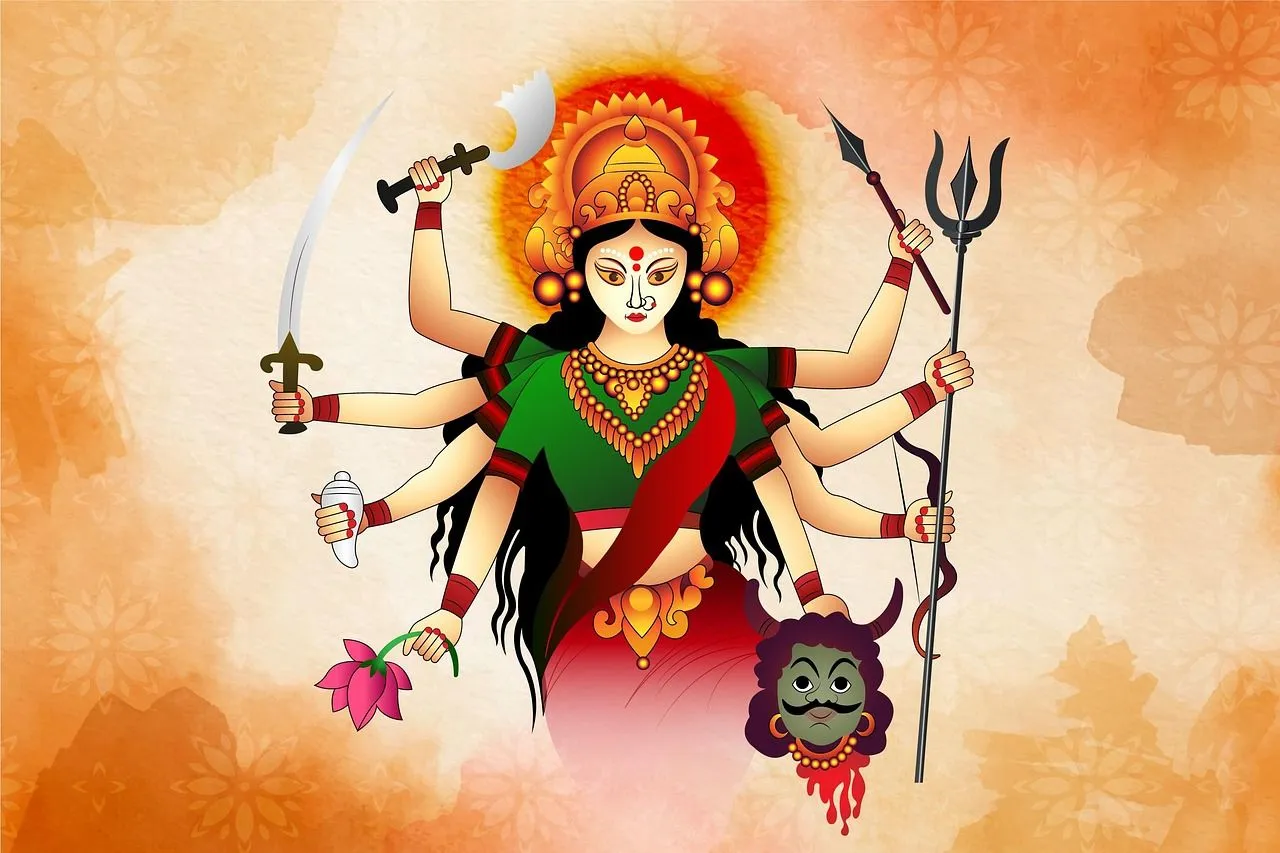Many a king or great woman has been brought down by their own lust, anger and greed. Similarly the great yogis like Shiva himself or Brahma, creator of the worlds. Who then can say they have mastered such instincts within their own nature? Or if they have, then who among them can say that they are forever free from the future temptations of these three qualities?

The name of the goddess who is the mistress of the material world may differ in cultures. She is most popularly known as Maya, Durga and other names. In ancient pictures of the gods, we sometimes see Shiva lying down with the goddess on top of him. She may even have his head decapitated and in her hands. Kali is another name of this goddess in her darker incarnation.
Certainly in this world of Maya's, she is in control via the material nature. We are all subject to her whims. We can only but rely on some kind of mercy because our own endeavors to master her allures still fall short. Such is the power of the ego.
Therefore, the aspirant knows that they are not the controller, that artificial claims at mastery are as rare as the philosopher's stone. Something which takes an alchemical process, involving time and effort. The Great Work is never complete in this material world.

It's a razor's edge to walk the path of perfection. There is danger at every step. Therefore, the journey is still long. There is not a moment to lose.
One day, when every step is a meditation or every word a song, then perhaps we may find ourselves a moment to pause and reflect. But until then, there is still room and time to improve.
But then what is time when you know you're going to make it there in the end anyway? It may take a million lifetimes, but if the goal is eternal bliss and knowledge then what's a few hundred thousand more or less?
We might think otherwise as soon as we stub our toe. That's when we're reminded of how fragile our human existence is. And how much more delicate it will become as we age toward our final years. Time is a great leveler. Time is Krishna, as he says in the Bhagavad Gita.
And that's fine because we use all the time available to refine the art, to perform more service in the world of names. Old soldiers never die, they march on into the sunset with their flag held high and their boots on the ground. They don the uniform and the armor for that lifetime and then shake it off only to go to another battlefield where their services are needed.
We will always be the agent for the source of all agency.
Bhagavad Gita ch5:26
कामक्रोधविमुक्तानां यतीनां यतचेतसाम् ।
अभितो ब्रह्मनिर्वाणं वर्तते विदितात्मनाम् ॥ २६ ॥
kāma-krodha-vimuktānāṁ
yatīnāṁ yata-cetasām
abhito brahma-nirvāṇaṁ
vartate viditātmanām
SYNONYMS
kāma—desires; krodha—anger; vimuktānām—of those who are so liberated; yatīnām—of the saintly persons; yata-cetasām—of persons who have full control over the mind; abhitaḥ—assured in the near future; brahma-nirvāṇam—liberation in the Supreme; vartate—is there; vidita-ātmanām—of those who are self-realized.
TRANSLATION
Those who are free from anger and all material desires, who are self-realized, self-disciplined and constantly endeavoring for perfection, are assured of liberation in the Supreme in the very near future.
PURPORT
Of the saintly persons who are constantly engaged in striving toward salvation, one who is in Kṛṣṇa consciousness is the best of all. The Bhāgavatam confirms this fact as follows:
yat-pāda-paṅkaja-palāśa-vilāsa-bhaktyā
karmāśayaṁ grathitam udgrathayanti santaḥ
tadvan na rikta-matayo yatayo 'pi ruddha-
srotogaṇās tam araṇaṁ bhaja vāsudevam.
"Just try to worship, in devotional service, Vāsudeva, the Supreme Personality of Godhead. Even great sages are not able to control the forces of the senses as effectively as those who are engaged in transcendental bliss by serving the lotus feet of the Lord, uprooting the deep grown desire for fruitive activities." (Bhāg. 4.22.39)
In the conditioned soul the desire to enjoy the fruitive results of work is so deep-rooted that it is very difficult even for the great sages to control such desires, despite great endeavors. A devotee of the Lord, constantly engaged in devotional service in Kṛṣṇa consciousness, perfect in self-realization, very quickly attains liberation in the Supreme. Owing to his complete knowledge in self-realization, he always remains in trance. To cite an analagous example of this:
darśana-dhyāna-saṁsparśair matsya-kūrma-vihaṅgamāḥ
svānya patyāni puṣṇanti tathāham api padmaja.
"By vision, by meditation and by touch only do the fish, the tortoise and the birds maintain their offspring. Similarly do I also, O Padmaja!"
The fish brings up its offspring simply by looking at them. The tortoise brings up its offspring simply by meditation. The eggs of the tortoise are laid on land, and the tortoise meditates on the eggs while in the water. Similarly, a devotee in Kṛṣṇa consciousness, although far away from the Lord's abode, can elevate himself to that abode simply by thinking of Him constantly—by engagement in Kṛṣṇa consciousness. He does not feel the pangs of material miseries; this state of life is called brahma-nirvāṇa, or the absence of material miseries due to being constantly immersed in the Supreme.
Reference: Bhagavad Gita As It Is, translation and commentary by Swami A C Bhaktivedanta, original Macmillan 1972 edition.
Image: https://pixabay.com/illustrations/ai-generated-hindu-style-goddess-8670920/
https://pixabay.com/illustrations/goddess-hindu-digital-art-painting-7478807/